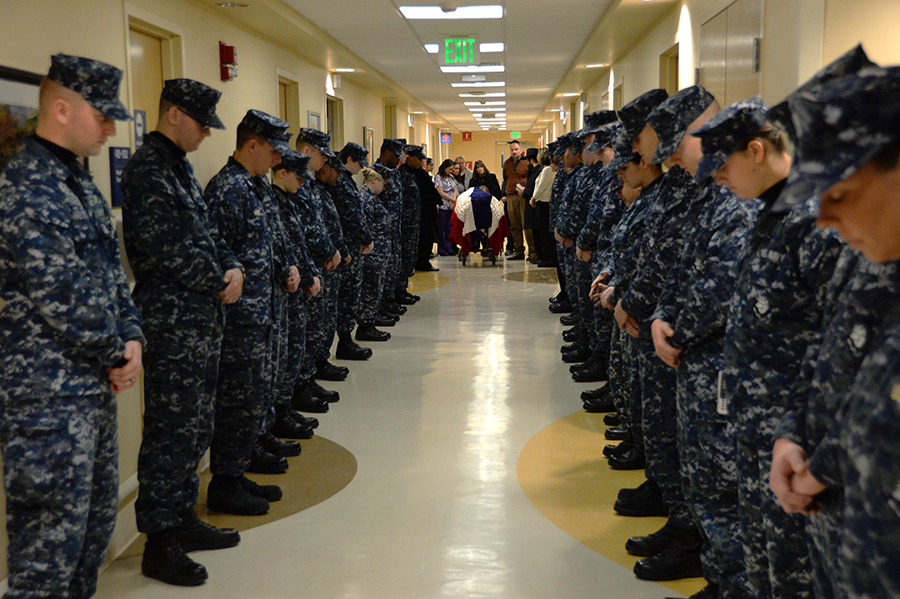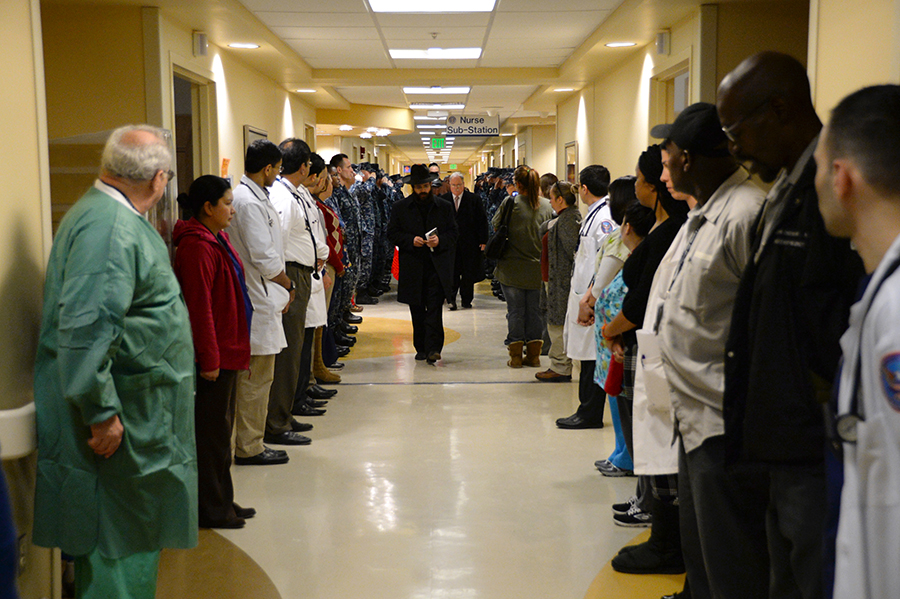
Sailors wait in a hallway on the medical-surgical floor at Lovell FHCC for the body of Holocaust survivor and Korean War Air Force Veteran Paul Argiewicz to be wheeled to the elevators. (Photo by Trevor Seela)
Navy sailors in their distinctive blue camouflage uniform and dozens of civilian employees lined both sides of the long hallway, heads down and hands clasped.
Dozens of family members, including his wife, Cheryl, and his young great-grandson, Mason, walked alongside him. A broad-striped red, white and blue blanket, lovingly hand-knit by strangers, covered him. His local rabbi, Tzali Wilschanski, in a tall black hat and dark waistcoat, led the procession.
Hands rose in solemn salutes as Holocaust survivor and Korean War Air Force Veteran Paul Argiewicz began his last journey on that Wednesday last December.
“It was amazing, it was incredible; there were so many people, his doctors and nurses, [and] so many in uniform … it was such a big honor. It wasn’t anything I ever expected or heard about; it was just unreal,” Cheryl Argiewicz said, remembering Dec. 11, 2013, the day her husband died at Captain James A. Lovell Federal Health Care Center and was given a “final salute.”
“It was the most beautiful thing,” she said.
For more than a decade, Argiewicz, 88, of Paddock Lake, Wis., was a frequent visitor to Lovell FHCC (and the North Chicago Veterans Affairs Medical Center before 2010) for outpatient appointments and some short hospitalizations. Most knew about the book, “Number 176520,” which told his harrowing story of surviving the Holocaust as a teenager.
So, on a crisp December morning, when staff received word of Argiewicz’s death on the medical-surgical floor, many gathered for his final salute.
“Everybody knew him at VA, in all the departments; everywhere we went, they would say, ‘Hi, Paul.’ He was just friendly. He loved to talk to everyone,” Cheryl recalled.

The Argiewicz family’s rabbi, Tzali Wilschanski, and the funeral director walk with the morgue cart as civilian employees and sailors pay their respects during the Final Salute. (Photo by Trevor Seela)
Minutes after Argiewicz died, hospice and palliative care coordinator Anna Abraham followed a procedure that she and the hospice and palliative care team had established the previous year, calling the hospital’s quarterdeck–an information desk at the main entrance manned by sailors–to round up final salute volunteers.
Abraham said these procedures are standard for every Veteran patient, no matter the hour or where in the hospital they die. “Our [hospice and palliative care] team wanted this – it’s the last thing we can do for our Veterans who have served our country, to honor them and pay respects,” she said.
Navy Hospitalman Gregory Spencer, from the optometry department, was one of the dozens of sailors who readily volunteered to help that day. It was the second time he had participated in a final salute. “Any time you are able to honor someone who has sacrificed in this way, and support the family, it’s a very meaningful thing,” Spencer said as he waited.
Spencer said the best part about joining a final salute line is the appreciation shown by the Veterans’ family members. “It’s just a short time out of my day, and it means so much to the family. It’s a privilege,” he said. “I’ll do it as many times as I can.”
Rev. Bill Vander Heyden, division officer for pastoral services, explained how the final salute at Lovell FHCC evolved from a “closed-door” policy to a celebration of life for staff and fellow patients, as well as family members and friends of the deceased Veteran.
“Our team decided we had to do something about the way we escorted the Veteran’s body off the unit,” Vander Heyden said. “It used to be that the other patients on the floor would have to go back to their rooms, and we would close their doors so they wouldn’t see and get depressed.”
But, in fact, Vander Heyden said what actually happened before the change in procedure was that fellow patients and staff members – who, in some cases, lived with and cared for the deceased Veteran every day in the facility’s community living center – didn’t have the chance to grieve and say goodbye.
“So we decided to do just the opposite, to call everyone together and do this final salute,” Vander Heyden continued. “This gives them an honorable, dignified way to leave, and it shows the other Veterans that when their time comes, the same ceremony will take place. Their fellow Veterans will have a chance to pay final respects.”
The patriotic blanket that is draped over the morgue cart adds a meaningful touch to the final salute. Vander Heyden recounted how nurse manager Joyce Wadlington had asked what could be done about the stark, off-white aluminum cart. The team decided against using an American flag, because they didn’t want to take away from the significance of the family receiving a flag at the Veteran’s funeral, he said.
Vander Heyden knew about a local craft group in McHenry Township named the Crafty “Happy” Hookers, who knit lap blankets for Veterans. The group, primarily made up of Veterans of Foreign Wars Auxiliary members, was happy to oblige. The facility now has several handmade blankets that are reused as needed in various parts of the hospital.
The final salute begins with the chaplain, or in Argiewicz’s case, his rabbi, reciting a prayer in the hall within earshot of those lined up, followed by the playing of Taps on a portable CD player as the body is wheeled down the hall. Those in uniform salute as the cart passes.
For Cheryl Argiewicz, the sight of her husband’s nurses and doctors, including his longtime primary care clinician Julia Kizhner, standing silently as they waited to start his final salute, was overwhelming. “She was just fantastic; so many people were fantastic, because they had a personal interest in Paul; so when I saw them there, it was just unbelievable.”
Although Argiewicz was not in hospice care when he died, he had made the decision, with the help of Dr. Kavita Sharma, attending physician for hospice and palliative care, to “stop fighting.” He had been hospitalized at Lovell FHCC for about six months, with a multitude of problems relating to his heart and kidneys.
“It got to the point when he said, ‘please don’t hurt me anymore,’ so we stopped all the stuff that was painful and made him comfortable,” Cheryl said.
Argiewicz’s Jewish faith dictated that his body not be embalmed or be buried on a Friday, the beginning of the Sabbath. Therefore, his body was transported directly from Lovell FHCC to the funeral home, and he received a full military funeral with a gun salute the next day. In the blur of the hours and days of the Jewish weeklong period of mourning known as Shiva, Cheryl was in awe of the outpouring of love and support for her husband.
“The man was just bigger than life,” she said. “I can’t even tell you how many cards, cakes …came to the home … there was a crowd gathered every night. It was amazing.”

Korean War Air Force Veteran Paul Argiewicz shows the tattoo from his imprisonment in Nazi camps during World War II. (Lovell FHCC File Photo)
Many people knew Argiewicz from the book “Number 176520,” about his ordeal in German camps during World War II. It was a story he frequently recounted to schoolchildren and civic groups, and at the annual “March of Remembrance” in Washington, D.C., over the years. The book, by Deanne Joseph, was named for the concentration camp number tattooed on his arm.
Paul Argiewicz, born in Bielsko, Poland, was arrested at age 10 by the Waffen-SS, the military force of Nazi Germany, for stealing bread for his family members, who were starving in the Jewish ghetto. More than once during his imprisonment, he lied about his age and work skills to survive. He was liberated from the Buchenwald concentration camp at age 15. His parents and an older sister did not survive the Holocaust.
After the war, he immigrated to America and joined the U.S. Air Force in 1952. He served as a crew chief in the Korean War, during which he was shot down. Seriously injured, he was captured and held prisoner for nearly a year.
“He bailed out the plane, lost part of his clavicle (collarbone) and his hearing,” Cheryl said. “He used to tell people that being a POW was nothing compared to the Holocaust.”
After he was discharged from the Air Force, Argiewicz worked as a steamfitter in Chicago and started his own business, Argo Heating and Cooling. He was widowed by his first wife and married Cheryl (then Erdman) in 1996.
In addition to public speaking, Cheryl said he counseled many fellow Veterans over the years, including some who were considering suicide. “He put a real value on life … he touched thousands of lives over the years,” she said.

Topics in this story
More Stories
The Social Security Administration is hoping to make applying for Supplemental Security Income (SSI) a whole lot easier, announcing it will start offering online, streamlined applications for some applicants.
Yusuf Henriques, an Army Veteran and former combat medic, is the founder and CEO of IndyGeneUS AI, a genomics company on a mission to improve health equity by increasing representation of women and racial minorities in clinical trials.
Online shopping scams are the riskiest scam for Veterans, with 77.3% of reports confirmed losing money when targeted by this scam.







I think this should be standard practice through ALL VA care facilities. My father was a Marine in WWII on Okinawa, and he left his leg there after a landmine took it from him. He spent the better part of 10 years at the hospice facility in Leavenworth, Kansas. Here’s just one of the awards he received for his duty. http://projects.militarytimes.com/citations-medals-awards/recipient.php?recipientid=37258
I wish my father would have gotten this kind of send off.
I am proud to see the way you celebrate the dedication and service of our “Greatest” generation and other veterans. It is really appreciated and thanks!!
A BEAUTIFUL STORY AND SEND OFF TO A BETTER LIFE.
MANY PEOPLE STILL DON’T BELIEVE THERE WAS A HOLOCAUST;
BUT DON’T SAY THAT TO THOSE WHO WERE THERE; UNFORTUNATELY
WE STILL HAVE EVENTS STILL HAPPENING IN THIS WORLD, AND WE’RE
STILL TURNING OUR HEADS; …THE SAD PART IT COULD HAPPEN IN ANY
COUNTRY…….DEPENDING ON THOSE THAT GOVERN IT.
It is only very rarely that we read a story about some brave veterans life that “reaches out and grabs you” like this one did for me. Thank you so much to everyone involved in his care and the writing account of his last few days. God Bless!
We must not let this to ever happen again.
We must always be vigilante with our government and fight for this great nation God gave us — The United States of America – which was Founded on Christian Principles
“MAY GOD HELP US TAKE BACK AMERICA FROM THE EVIL FORCES WITHIN”